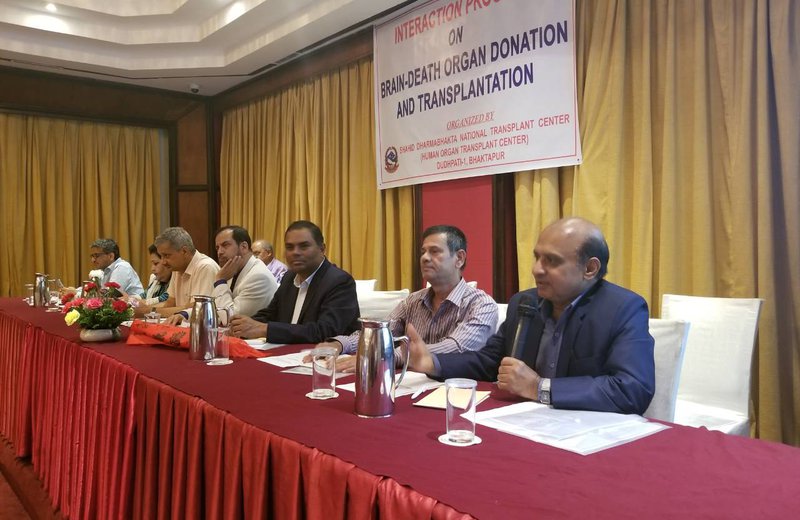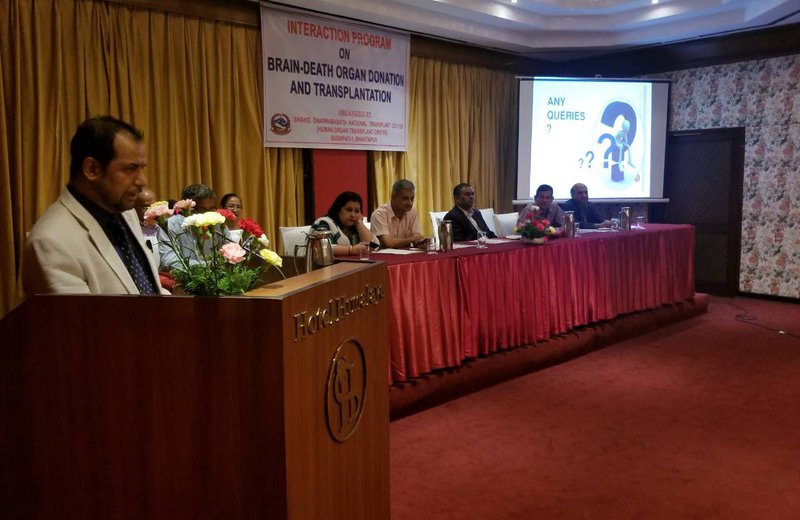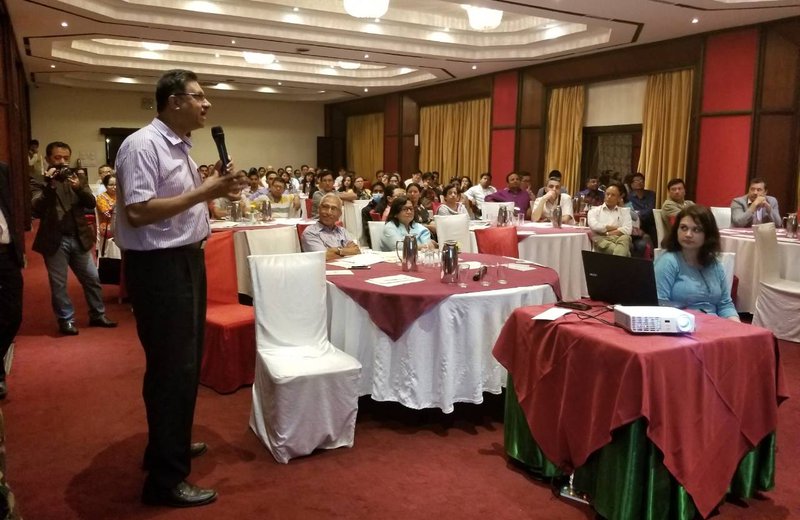INTERACTION PROGRAM ON BRAIN-DEATH ORGAN DONATION AND TRANSPLANTATION
Sept. 3, 2018

None

None

None
August 21, 2018 (Tuesday)
Shahid Dharmabhakta National Transplant Center, Bhaktapur organized interaction program on Brain- death Organ Donation and Transplantation. The program was organized at the Hotel Himalaya, Pulchowk and was marked by Honorable Deputy Prime Minister and Health and Population Minister Mr. Upendra Yadav as the Chief Guest. Similarly, distinguished clinicians like Dr. Basant Pant, Dr. Yadav Dev Bhatta, Dr. Prakash Regmi, Dr. Rajani Hada, Dr. Sangita Bhandari, Dr. Subosh Adhikari and social workers, journalists and doctors from various hospitals participated enthusiastically in the program.
The main objective of this program was to strengthen the brain-death donor organ donation and transplantation in the country and to exchange ideas on various facilitating as well as hindering factors. "There is an extreme need of awareness programs and coordination among the health care professionals and I will do everything possible to facilitate this noble cause", said the Honorable Minister Upendra Yadav.
Similarly, Dr. Basanta Pant said "We have the legislation; now we need to address various social, religious, spiritual and political that are affecting brain-death organ donation rates." Majority of the participants focused upon the need of extensive awareness and motivational programs among not only the general population but also health professionals.
Shahid Dharmabhakta National Transplant Center is dedicated to providing organ donation and transplantation services in the country. It was established by Ministry of Health and Population the 2012. This center has already carried out nearly 500 kidney transplants so far and is also the instigator of the first liver transplant in the country, having done three successful liver transplants so far. It has also conducted two kidney transplants from one brain-dead donor, which is first of its kinds in the nation.
Since then, this center has been trying to carry out other transplant from the brain dead donors but due to various hindering factors, it has not been able to do so. Every year nearly 3000 people suffer from kidney failure and unfortunately 90% die within the following few months. Likewise, the incidence of liver failure is 1000. The number of people awaiting organ donation and transplantation due to the scarcity of or incompatibility with living donors is also in the increasing trend. This calls out for the need of awareness, motivation among general population and coordination among various hospitals and health care workers to make them realize the urgency and importance of regularizing brain-death organ donation and transplantation in the country.
Recently in 2016, The Parliament of Nepal has made massive amendments in the Old Organ Transplant Act of 2055- Expansion of living donor pool, Initiation of pair exchange programs and most importantly, transplants from a brain-dead donor. The best one is transplantation from a brain-dead donor as the donor risk is zero. In addition, strengthening brain-death donor program would help halt the incidence of organ trafficking and gender inequality as seen in the area of organ transplantation. "If the newly amended legislation is implemented effectively, not only would this save lives for numerous Nepalese people but would also dissuade people from travelling to neighboring countries and pay much higher fees to receive organs. They would be able to spend substantially lower amounts of money to get the procedure done in Nepal, which would also help the local economy and reduce drainage of our money overseas", said Dr. Pukar Chandra Shrestha, Executive Director and Chief Kidney/Liver/Pancreas Surgeon, Shahid Dharmabhakta National Transplant Center, Bhaktapur.
Above all, the organs that goes wasted can be used for enlightening the lives of thousands of people with organ failure. At least 8 different organs can be harvested from one brain dead person such as, two kidneys, two lungs, one heart, one liver, one pancreas, one small intestine as well as two corneas and skin.
In Kathmandu alone, road accidents leave around one thousand people brain dead, whose organs, if procured, could save thousands of lives.
Any hospital or health centre that declares a person brain dead must immediately inform a coordination unit designated by the Nepal Government. Upon receiving the information, the unit must then contact related health institutions for organ procurement and transplantation. The donor hospital will be responsible for providing necessary resources for organ retrieval procedures whereas the co-ordination unit will arrange the proper storage of the organs. It must also have extensive database of organ recipients as well as distributing the organs following strict government criteria. At present, Shahid Dharmabhakta National transplant Center (Human Organ Transplant Centre), Bhaktapur has been designated as the Coordination Unit by the Ministry of Health and Population.
Thus, it is a high time that we talk about brain-death organ donation and make people aware of such provisions in the country. There are many factors that are interlinked with one another and are affecting the organ donation rates. It is the duty of every citizen and stake holders to put input from their areas in promoting brain-death organ donation and transplantation.